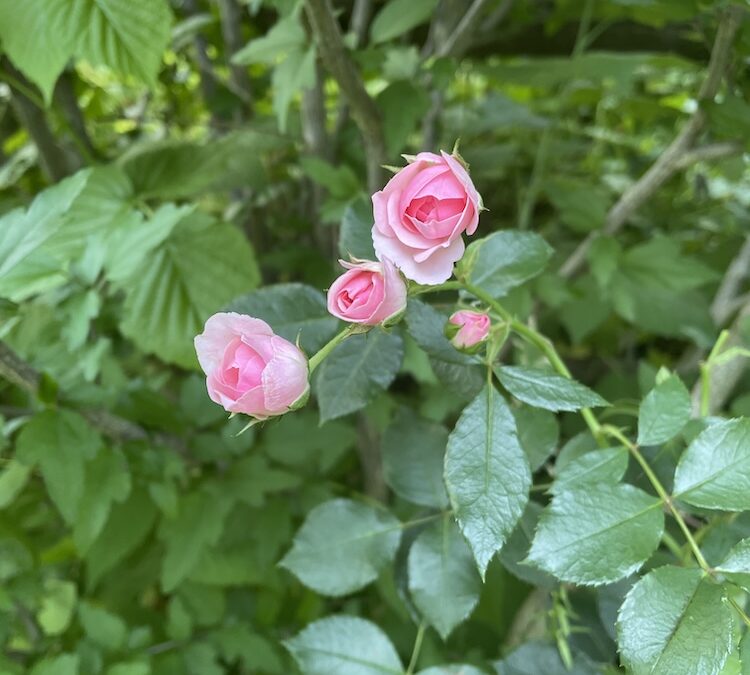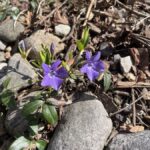Let’s begin with nurturing. To nurture essentially means to tend to that what already is. We don’t push seeds into the frozen ground in winter, it is not their time yet to grow, they will not grow no matter the force we apply. We’ll only hurt them, and we’ll frustrate ourselves. We also don’t force a rose to become an apple tree, it will not. We shift our eyes towards that what is – and we give it our attention, our love, our caring, our listening. We nurture that what already is present, beside us and infront of us – so that we breathe life and love into it – so that it continues to exist and grow into its true essence and scent. And in spring, surely our hands will still be loving, hearts will be open, and we’ll be attentive – and the soil will be ready also, for our beautiful roses to be planted, nourished and grown.
Nurturing asks of our hearts to honour the present moment. Nurturing is about a certain kind of understanding the cycles of the land, the timing of life, and accept the unique paths, expressions and timings of each one of us. It is about creating the needed space for something to grow and develop as it needs, through our nurturing every day, with our loving hands, with the water and the sun’s warm rays, nourishing the soil, nourishing all that needed nourishment, and allowing it to be, with a kindness and patience of rhythm. In love, we too allow ourselves and each other to be, and we devote to one another, we take care of one another, we support one another, and we love. Whatever may blossom from that soil is whatever it will be.
This is what we do in relationships also – or rather, this is what love asks of us. When soul kisses soul on the human lips, of our love a new soul is born: the soul of the relationship. And it has its own soil, upon which we walk, and shape and form things along the way. It is the emotional, spiritual and physical wildlands of our relationship. And in our intimate sensitive private cocoon, we nurture our space, tend to one another, love one another.
The great theologian and philosopher Augustine once defined love as “Amo: Volo Ut Sis”, which translated from Latin means “I Love: I Will That You Are”. What this statement implies is that the only thing love requires is for us to just “be”, as love is about full acceptance, of ourselves and others. Love is a sense of being and in the being is the meaning.
Love wills us to be. Love is like bread – it is to be made and remade each morning, each day, made anew, made continuously. If it only remains as beautiful idea in the sky, what is the purpose of it? Love is meant to be embodied.
Love has many shapes and forms, different speeds and movements. It unfolds through compassion, kindness, patience, devotion, grace, forgiveness, gentleness, tenderness, playfulness, curiosity, generosity, charity, laughter … and each time we embody it through our every day words, hands and seemingly ordinary gestures, we give it life. So love is a verb, it is an effort every day, and no small thing is too small.
A love that pays attention is a love that is alive.
Paying attention means putting down our phones, switching off the TV, and looking into each other’s eyes, not assuming that we know everything about our partners. Paying attention means seeing the fears and doubts behind our beloved’s smile after a long day of work and asking, “Tell me my love, what’s going on, how can I make your day better?” We need to have the humility to challenge our own ways and ideas when new insights emerge, and to accept that we change; we need to re-discover, re-learn, and re-adjust. Often times in relationships we give what we want to receive, rather than what our partner needs.
Paying attention means touching, holding, kissing and caring for our partner not in the way we always did, but in the way they need us to, right now.
To pay attention means that we love our partner and accept them as they are; fully accepting all of their parts, present and gone, shiny and dark, because all of us constantly change. It means that we’ll have to sit by their side throughout sadness, failures, and rejections. It means we’ll sit beside them and together, holding their hand, say goodbye to all their dreams that never happened, and the people that they never became, and their many selves that went away. And we love them, still, and through it all. And we love us too, the same.
No matter how many years we’ve lived with someone under the same roof, we need to have the humility to accept that we don’t know everything about another person, because they too, as we, change and evolve beneath the shroud of skin. Love that pays attention sees the beauty of our lover every single day, and is responsible, responsive, and alive to it.
And when we pay attention, we fall in love all over, again and again, because we discover new shades in our partner, like art; we explore one another like a painting because there is always a new angle and a new shade that we might discover. We become mystics embracing the beginner’s mind. And how beautiful it is to explore the unique changing world of another person. We can only love what we appreciate; and to appreciate takes time, effort, devotion, and acceptance.
Love says:
Volo ut sis. I will that you are. I want you to be. I want every day for you. I want every moment for you. I love your being in and of itself. I love the miracle of your existence in my world, in my life, as you are, as it be.
Indian philosopher Jiddu Krishnamurti once said, “Only those who’ve never truly loved, ask me questions about life’s purpose. Why does living need a purpose other than its mere being? Are we not worthy, as is?” True lovers have the ability to change stones into flowers of discovery; they live a life of purpose because they live wholebodily and wholeheartedly, enriching the dreams of humanity, within and without. It is these dreams that create history. It is these lovers who are the unknowing transformers of all things, of life itself, only by their love towards all that they do. To love is not too little, is not too small; it’s enough.
It’s about devotion. Devotion is the veil through which awareness shows its beautiful face.
Many years ago, we lived in a tiny place, where at the corner of our window, a swallow bird had built her nest. Shortly after her little ones were born, a horrible thunderstorm hit, breaking the nest in half and leaving the babies hanging, as if they’d fall any minute. We quickly took them in and placed them in a tiny shoebox with paper shredded to resemble their home; they were trembling, crying, and were so incredibly fragile and small, that we barely found a small enough eyedropper to feed them some water. In the morning, we placed the shoebox with them in it out on the window’s railing, hoping their mother would come back.
A few days passed, then a week. We cared for them as best as we could every day. Until one morning when we woke up and saw that some swallows were feeding the little ones in the shoebox. All of them survived and grew healthily. One September afternoon, we saw them standing on the edge of the box and as they jumped down, their wings took flight in the most beautiful way; they circled around a few times – before us, coming as close to us as a hand’s length, until finally flying away, together. The next year, new ones came, or perhaps it was the same ones.
Devotion can sometimes be regarded as some grand thing, high-minded and even abstract. But it is often found in an ordinary day. And it isn’t something we find; often times, devotion finds us.
We don’t have to look up high searching for it and the truth is, even still we may still not find it. Devotion appears in its own shape and follows its own timing and rhythm of heart. But when it finds us – it is an absolute, non-negotiable extension of hands, that we do our best, and love wholeheartedly; not just a little bit or partly, and not just when it’s convenient or easy.
Devotion is something that monks practice regularly – their lives are based upon it. They tend to the gardens, to each other. And while it may seem a little non-sensical, we can actually learn what to love means through monasticism. Truth be told, and I’ve spoken to many monks in my life, they will often tell you that to learn to love is their greatest lesson too.
You see, people go into these sacred places and see these monks and nuns with their peaceful aura, and there is so much kindness and love in their interactions; and people think, “Wow, it is so easy for you to love!” But what they don’t realize is the long path it took to get to here. They don’t know the hard work it takes to love, because love is a kingdom for the brave, not for the faint hearted.
It is easy to love from afar. It is easy to love statues and images and buildings such as churches or temples, because perhaps they don’t move, they stay perfect, so they can’t hurt us. But human beings … well, we’re hard to love; we change, we are non-sensical, we have flaws and imperfections, and unfortunately, we hurt and disappoint one another. People sometimes are afraid to love a person, because feelings are not stable as rock, and they fear the pain they’d feel after the other’s feelings change.
True love can only begin after the disillusionment. In many ways, love is an acceptance of our humanness, and willingness to still love.
And for the monks, just like for all of us as human beings, learning to love is their greatest lesson, and the most difficult too; because it isn’t about the scriptures, it is about the living together, and having that lived-out expression of the love that the faith is. In monastic life, you spend your days in a cell, day in and day out, for years and years, bearing the burdens of another. No, you can’t go for a walk when you are annoyed; you can’t put on your headphones or watch a movie in the other room; you can’t quit on each other and walk out; you can’t only show up when it’s convenient for you do so; you can’t just do whatever only you want to without tolerance or understanding of the interconnection and interdependence of all others around you.
Every person has their good and not so great sides, but one must accept, understand, have compassion, and finally, learn to love the full person, with a kindness and patience of rhythm. And really, truly, that’s our greatest purpose in this life: to learn to love, and to be of service to another.
It is clear that we have many divisions in our world, and that we are often separated. And I don’t think we’ll ever not be – I don’t think all will ever agree on everything. But we can still be working together in the union that humanity is. And there is so much to learn. And it’s a privilege to be able to learn, and to keep ourselves humble enough to learn with openness of minds.
We all have our own opinions, experiences and perspectives, and that’s fine. But I believe that if we want to nurture unity it begins with us, rather than waiting for countries, governments and people to agree.
I believe nurturing unity looks like reaching our hands across the lines that separate us; and then kindly saying, “Hi, my name is … This is what I believe, but I want to learn what you believe.” And then, we sit, listen and learn.
This is how love begins also, how it is nourished and nurtured and sustained. It begins with us, reaching our hands across the lines that separate us; and saying, tell me, how do you feel, what do you need, what can I do to make your day better. And then to sit, listen and learn.
For one-on-one consultations with me, please visit my Offerings.

For more of my writings, browse through my Art of Love.
If you wish to support me, you may do so by sharing my articles and poems, buy my poetry books or donate some magic coins in my hat on Paypal. If you would like to work with me, visit my Offerings.
Your support means so much to me! Thank you wholeheartedly!
Cover photograph by me, of our beautiful wild roses.





